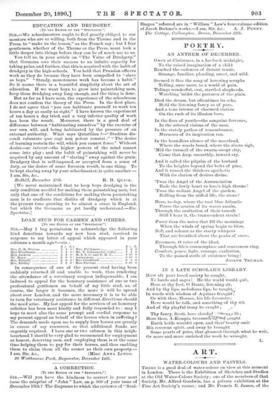EDUCATION AND DRUDGERY.
!To THE EDITOR OP THE " SPECTATOR."' Sin,—We schoolmasters ought to feel greatly obliged to our mentors who are so willing, both from the Throne and in the Press, to " make us the lesson," as the French say ; but I fear gentlemen, whether of the Throne or the Press, must look a little deeper into things before they can be of much use to us.
You tell us, in your article on "The Value of Drudgery," that Germans owe their success to an infinite capacity for -taking pains, and further, that this is acquired with the habit of drudgery in the high-schools. You hold that Prussian officers work as they do because they have been compelled to " slave as boys." "Steady, monotonous work has become a habit." So it seems there is a beautiful simplicity about the art of -education. If we want boys to grow into painstaking men, keep them drudging away long enough, and the thing is done.
But as far as I have seen, the experience of the schoolroom -does not confirm the theory of the Press. In the first place,
I do not agree that " you can habituate yourself to work ten hours a day as easily as eight." I have known the experiment of ten hours a day tried, and a very inferior quality of work has been the result. Moreover, there is a good deal of -difference between "habituating ourselves" by the exercise of -our own will, and being habituated by the pressure of an external authority. What says Qaintilian P—" Stadium dis- -cendi voluntate qua; cogi non potest constat :" " The desire -of learning rests in the will, which you cannot force." Without desire—or interest—the higher powers of the mind cannot come into play ; and the habit of painstaking will never be -acquired by any amount of " slaving" away against the grain. Drudgery that is self-imposed, or accepted from a sense of duty, or the desire of some foreseen result, is one thing. To be kept slaving away by your schoolmaster, is quite another.— I am, Sir, &c.,
[We never maintained that to keep boys drudging is the -only condition needful for making them painstaking men, but only that one of the conditions for making them painstaking men is to eradicate that dislike of drudgery which is at the present time growing to be almost a craze in England, but which the Germans as yet hardly understand.—En. Spectator.]










































 Previous page
Previous page